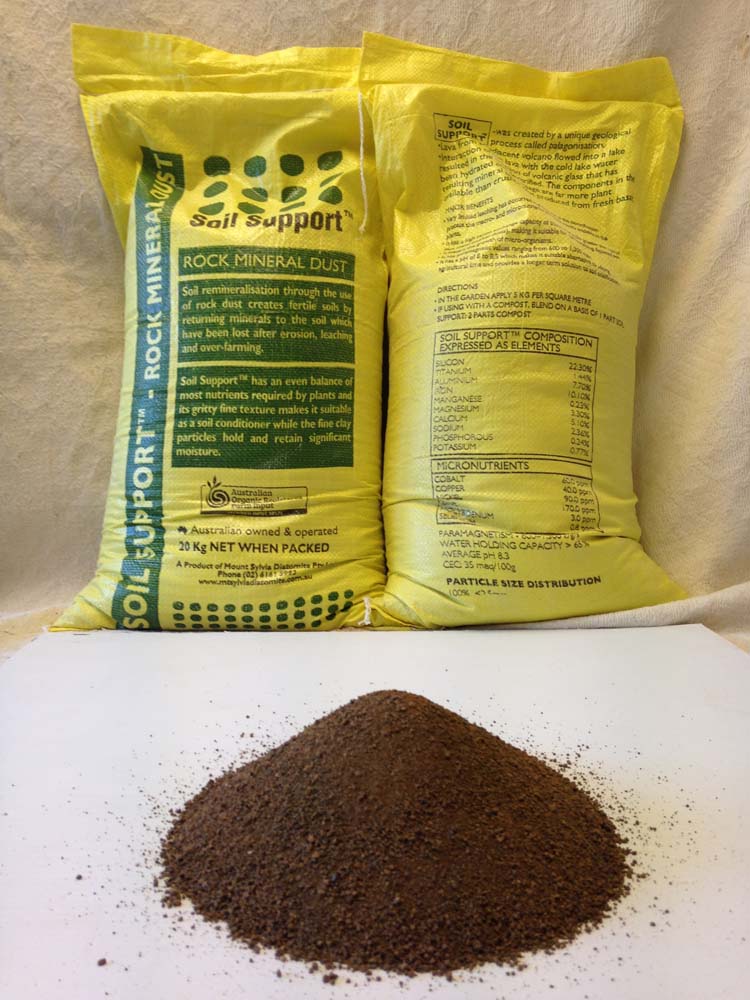Mount Sylvia Palagonite Soil Support (Diatomaceous Earth) 20kg
Mount Sylvia Palagonite Soil Support (Diatomaceous Earth) 20kg
The Soil Support product is the Fine Palagonite packed in 20 Kg bags. It is particularly sort after by urban back yard gardeners who are seeking quicker responses through the finer nature of this product. It is suggested that this product provides a higher plant available outcome for micro and macro nutrients because microbes will be able to latch onto the particles more easily and then feed the root systems of plants.
MAJOR BENEFITS •Very limited leaching has occurred and because of the devitrification process the macro- and micronutrients are more readily available to the plants. • It has a high cation exchange capacity of 34meq/100g (far greater than typical blue metal crusher dusts), making it suitable for remineralising depleted soil. • It fosters the growth of micro-organisms. • It has paramagnetic values ranging from 600 to 1,300 c/g/s. • It has a pH of 8 to 8.5 which makes it suitable alternative to adding agricultural lime and provides a longer term solution to soil acidification. • It has a very high water holding capacity.
WHAT IS ROCK MINERAL DUST? Rock quarries in Australia normally produce aggregate products for road construction and repair. The crushing processes required to produce these products also produces a fine grained by-product known as crusher dust or rock mineral dust. Quarry operators have been selling this crystalline material as a rock dust re-mineralizer aimed at farmers and in particular organic farmers, who do not use conventional chemical fertilisers (typical NPK products). The benefit of the crusher dust is that it helps restore a broad spectrum of elemental nutrients to the soil. Finely ground rock dusts can also help to reduce compaction and improve water holding capacity in soils; they also improve the environment that aids the proliferation of soil microbes. This can be accelerated by the blending of fine rock dusts with composted products that may include chicken, cow and other animal manures, or mushroom compost. Bacteria and fungi are the well-known highways for the transport of minerals into the root systems of plants.
WHY USE PALAGONITE INSTEAD OF OTHER ROCK MINERAL DUSTS The largely amorphous composition of Mt Sylvia Palagonite, has resulted in a product that is both a supplier and retainer of plant available nutrients. The Cation Exchange Capacity (CEC) of a soil is a measure of its ability to retain both nutrients and water. It is closely related to fertility and is a measure of the number of exchangeable cations per dry weight that a soil is capable of holding at a given pH value and be available for exchange in soil-water combinations. Normal quarry derived basalt dust has CEC values ranging from 4 to 14 meq/100g while Mt Sylvia Palagonite averages around 34 meq/100g. This mostly reflects the smectite clay component of the material. This smectite clay content also enhances the water holding capacity. In addition Mt Sylvia Palagonite has a good paramagnetic response (600-1300 c) COMPARING PALAGONITE WITH ZEOLITE Palagonite has a similar water holding capacity to zeolite (25-40%) and this relates to the smectite content of the product. Palagonite also has a substantial advantage over zeolite in the wide range of additional plant available macro and micro nutrients and does not contain any quartz which in a powdered form is a known health hazard if inhaled. The dominant exchangeable cations in palagonite are calcium and magnesium with minor sodium and potassium. Natural Australian zeolites on the other hand have sodium as the dominant exchangeable cation.
APPLICATION Application rates will vary but, when using Palagonite for the first time a generous application is normally recommended. Because the minerals in Palagonite will break down at a slower rate than with chemical fertilisers the aim is to create a reserve of the beneficial elements for the soil microbes and fungi to access as required. For the back yard vegetable gardener the optimum rate is around 1 kilogram per square metre in conjunction with a comparable amount of compost. For tree planting you may consider higher rates of application. In an example of a commercial horticulture practice, apply Palagonite in conjunction with composted chicken manure at 12 tonnes/ Ha. (6 tonnes of Palagonite and 6 tonnes of composted manure).


